International Business Report: MacDonald's Operations and Strategies
VerifiedAdded on 2020/07/22
|10
|2769
|74
Report
AI Summary
This report provides a comprehensive analysis of MacDonald's international business operations. It begins with an explanation of the international business environment, including political, economic, sociological, technological, environmental, and legal factors. The report then describes mechanisms regulating international trade, such as trade blocs, free trade, quotas, and embargoes. It further explores how the environment and culture of other countries affect a business operating internationally, using PESTLE analysis. The monetary environment's impact on international businesses is also discussed. The report identifies the reasons why businesses operate internationally, including market expansion, cheaper manufacturing, and economies of scale. Finally, it explains various business strategies employed by international businesses, providing a detailed overview of MacDonald's global operations and market positioning.
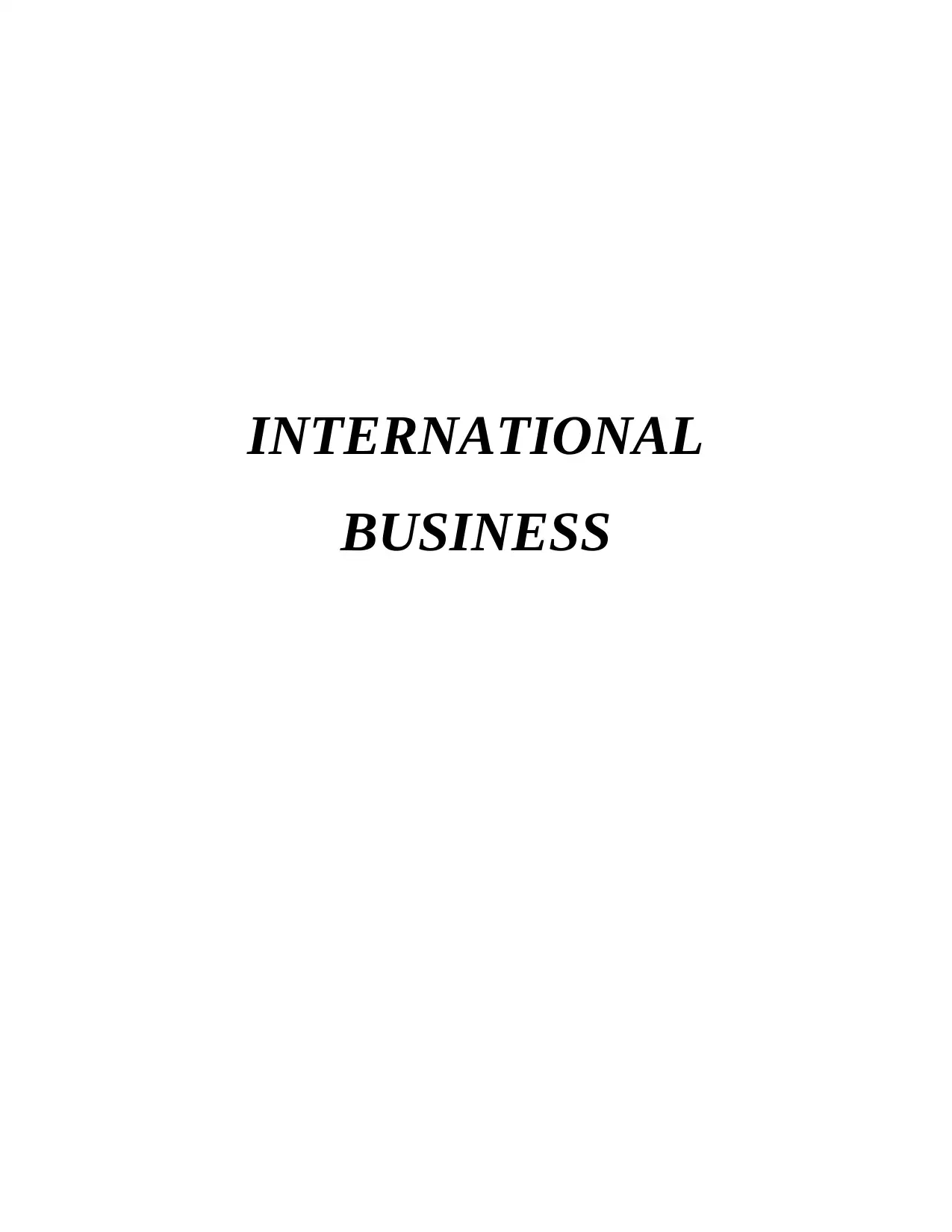
INTERNATIONAL
BUSINESS
BUSINESS
Paraphrase This Document
Need a fresh take? Get an instant paraphrase of this document with our AI Paraphraser
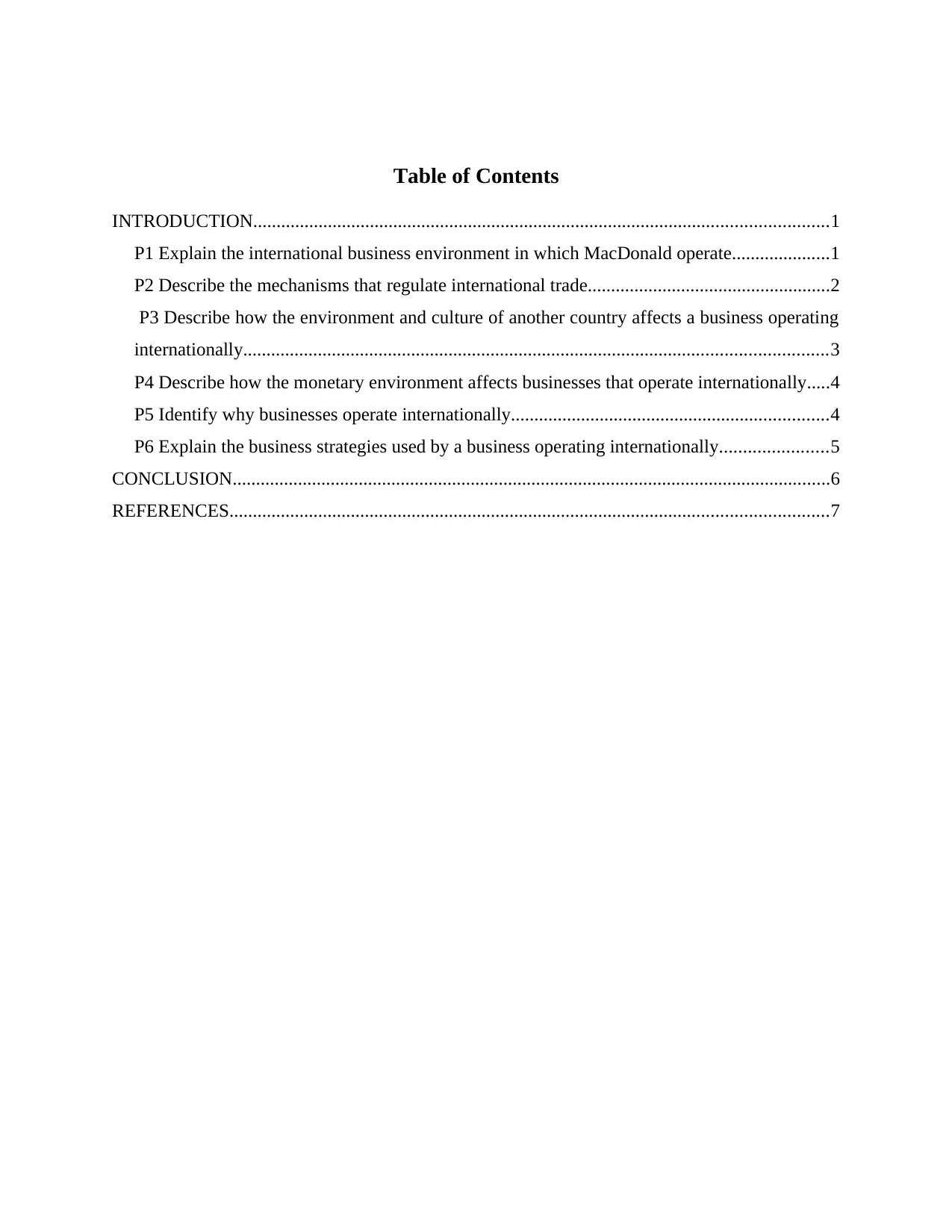
Table of Contents
INTRODUCTION...........................................................................................................................1
P1 Explain the international business environment in which MacDonald operate.....................1
P2 Describe the mechanisms that regulate international trade....................................................2
P3 Describe how the environment and culture of another country affects a business operating
internationally.............................................................................................................................3
P4 Describe how the monetary environment affects businesses that operate internationally.....4
P5 Identify why businesses operate internationally....................................................................4
P6 Explain the business strategies used by a business operating internationally.......................5
CONCLUSION................................................................................................................................6
REFERENCES................................................................................................................................7
INTRODUCTION...........................................................................................................................1
P1 Explain the international business environment in which MacDonald operate.....................1
P2 Describe the mechanisms that regulate international trade....................................................2
P3 Describe how the environment and culture of another country affects a business operating
internationally.............................................................................................................................3
P4 Describe how the monetary environment affects businesses that operate internationally.....4
P5 Identify why businesses operate internationally....................................................................4
P6 Explain the business strategies used by a business operating internationally.......................5
CONCLUSION................................................................................................................................6
REFERENCES................................................................................................................................7
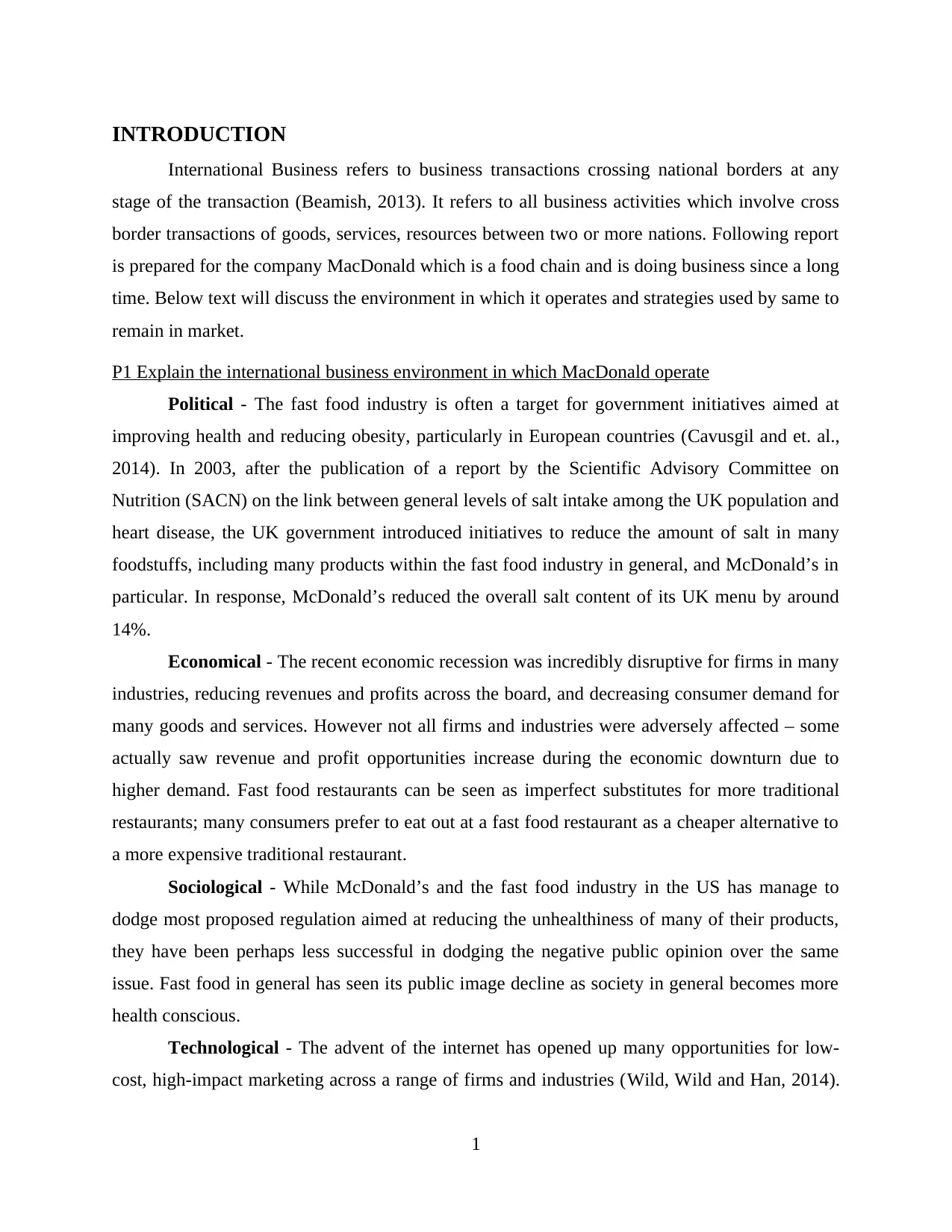
INTRODUCTION
International Business refers to business transactions crossing national borders at any
stage of the transaction (Beamish, 2013). It refers to all business activities which involve cross
border transactions of goods, services, resources between two or more nations. Following report
is prepared for the company MacDonald which is a food chain and is doing business since a long
time. Below text will discuss the environment in which it operates and strategies used by same to
remain in market.
P1 Explain the international business environment in which MacDonald operate
Political - The fast food industry is often a target for government initiatives aimed at
improving health and reducing obesity, particularly in European countries (Cavusgil and et. al.,
2014). In 2003, after the publication of a report by the Scientific Advisory Committee on
Nutrition (SACN) on the link between general levels of salt intake among the UK population and
heart disease, the UK government introduced initiatives to reduce the amount of salt in many
foodstuffs, including many products within the fast food industry in general, and McDonald’s in
particular. In response, McDonald’s reduced the overall salt content of its UK menu by around
14%.
Economical - The recent economic recession was incredibly disruptive for firms in many
industries, reducing revenues and profits across the board, and decreasing consumer demand for
many goods and services. However not all firms and industries were adversely affected – some
actually saw revenue and profit opportunities increase during the economic downturn due to
higher demand. Fast food restaurants can be seen as imperfect substitutes for more traditional
restaurants; many consumers prefer to eat out at a fast food restaurant as a cheaper alternative to
a more expensive traditional restaurant.
Sociological - While McDonald’s and the fast food industry in the US has manage to
dodge most proposed regulation aimed at reducing the unhealthiness of many of their products,
they have been perhaps less successful in dodging the negative public opinion over the same
issue. Fast food in general has seen its public image decline as society in general becomes more
health conscious.
Technological - The advent of the internet has opened up many opportunities for low-
cost, high-impact marketing across a range of firms and industries (Wild, Wild and Han, 2014).
1
International Business refers to business transactions crossing national borders at any
stage of the transaction (Beamish, 2013). It refers to all business activities which involve cross
border transactions of goods, services, resources between two or more nations. Following report
is prepared for the company MacDonald which is a food chain and is doing business since a long
time. Below text will discuss the environment in which it operates and strategies used by same to
remain in market.
P1 Explain the international business environment in which MacDonald operate
Political - The fast food industry is often a target for government initiatives aimed at
improving health and reducing obesity, particularly in European countries (Cavusgil and et. al.,
2014). In 2003, after the publication of a report by the Scientific Advisory Committee on
Nutrition (SACN) on the link between general levels of salt intake among the UK population and
heart disease, the UK government introduced initiatives to reduce the amount of salt in many
foodstuffs, including many products within the fast food industry in general, and McDonald’s in
particular. In response, McDonald’s reduced the overall salt content of its UK menu by around
14%.
Economical - The recent economic recession was incredibly disruptive for firms in many
industries, reducing revenues and profits across the board, and decreasing consumer demand for
many goods and services. However not all firms and industries were adversely affected – some
actually saw revenue and profit opportunities increase during the economic downturn due to
higher demand. Fast food restaurants can be seen as imperfect substitutes for more traditional
restaurants; many consumers prefer to eat out at a fast food restaurant as a cheaper alternative to
a more expensive traditional restaurant.
Sociological - While McDonald’s and the fast food industry in the US has manage to
dodge most proposed regulation aimed at reducing the unhealthiness of many of their products,
they have been perhaps less successful in dodging the negative public opinion over the same
issue. Fast food in general has seen its public image decline as society in general becomes more
health conscious.
Technological - The advent of the internet has opened up many opportunities for low-
cost, high-impact marketing across a range of firms and industries (Wild, Wild and Han, 2014).
1
⊘ This is a preview!⊘
Do you want full access?
Subscribe today to unlock all pages.

Trusted by 1+ million students worldwide
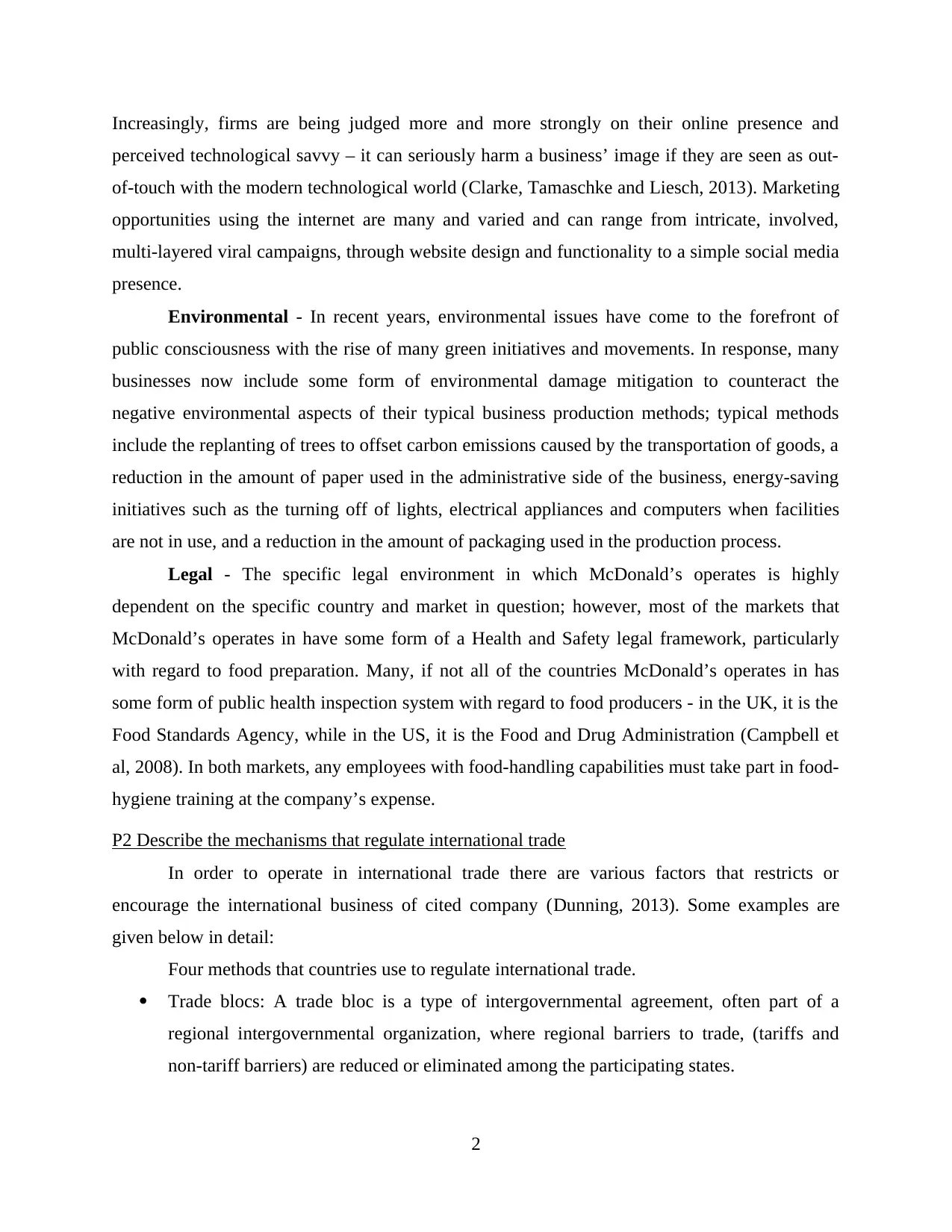
Increasingly, firms are being judged more and more strongly on their online presence and
perceived technological savvy – it can seriously harm a business’ image if they are seen as out-
of-touch with the modern technological world (Clarke, Tamaschke and Liesch, 2013). Marketing
opportunities using the internet are many and varied and can range from intricate, involved,
multi-layered viral campaigns, through website design and functionality to a simple social media
presence.
Environmental - In recent years, environmental issues have come to the forefront of
public consciousness with the rise of many green initiatives and movements. In response, many
businesses now include some form of environmental damage mitigation to counteract the
negative environmental aspects of their typical business production methods; typical methods
include the replanting of trees to offset carbon emissions caused by the transportation of goods, a
reduction in the amount of paper used in the administrative side of the business, energy-saving
initiatives such as the turning off of lights, electrical appliances and computers when facilities
are not in use, and a reduction in the amount of packaging used in the production process.
Legal - The specific legal environment in which McDonald’s operates is highly
dependent on the specific country and market in question; however, most of the markets that
McDonald’s operates in have some form of a Health and Safety legal framework, particularly
with regard to food preparation. Many, if not all of the countries McDonald’s operates in has
some form of public health inspection system with regard to food producers - in the UK, it is the
Food Standards Agency, while in the US, it is the Food and Drug Administration (Campbell et
al, 2008). In both markets, any employees with food-handling capabilities must take part in food-
hygiene training at the company’s expense.
P2 Describe the mechanisms that regulate international trade
In order to operate in international trade there are various factors that restricts or
encourage the international business of cited company (Dunning, 2013). Some examples are
given below in detail:
Four methods that countries use to regulate international trade.
Trade blocs: A trade bloc is a type of intergovernmental agreement, often part of a
regional intergovernmental organization, where regional barriers to trade, (tariffs and
non-tariff barriers) are reduced or eliminated among the participating states.
2
perceived technological savvy – it can seriously harm a business’ image if they are seen as out-
of-touch with the modern technological world (Clarke, Tamaschke and Liesch, 2013). Marketing
opportunities using the internet are many and varied and can range from intricate, involved,
multi-layered viral campaigns, through website design and functionality to a simple social media
presence.
Environmental - In recent years, environmental issues have come to the forefront of
public consciousness with the rise of many green initiatives and movements. In response, many
businesses now include some form of environmental damage mitigation to counteract the
negative environmental aspects of their typical business production methods; typical methods
include the replanting of trees to offset carbon emissions caused by the transportation of goods, a
reduction in the amount of paper used in the administrative side of the business, energy-saving
initiatives such as the turning off of lights, electrical appliances and computers when facilities
are not in use, and a reduction in the amount of packaging used in the production process.
Legal - The specific legal environment in which McDonald’s operates is highly
dependent on the specific country and market in question; however, most of the markets that
McDonald’s operates in have some form of a Health and Safety legal framework, particularly
with regard to food preparation. Many, if not all of the countries McDonald’s operates in has
some form of public health inspection system with regard to food producers - in the UK, it is the
Food Standards Agency, while in the US, it is the Food and Drug Administration (Campbell et
al, 2008). In both markets, any employees with food-handling capabilities must take part in food-
hygiene training at the company’s expense.
P2 Describe the mechanisms that regulate international trade
In order to operate in international trade there are various factors that restricts or
encourage the international business of cited company (Dunning, 2013). Some examples are
given below in detail:
Four methods that countries use to regulate international trade.
Trade blocs: A trade bloc is a type of intergovernmental agreement, often part of a
regional intergovernmental organization, where regional barriers to trade, (tariffs and
non-tariff barriers) are reduced or eliminated among the participating states.
2
Paraphrase This Document
Need a fresh take? Get an instant paraphrase of this document with our AI Paraphraser
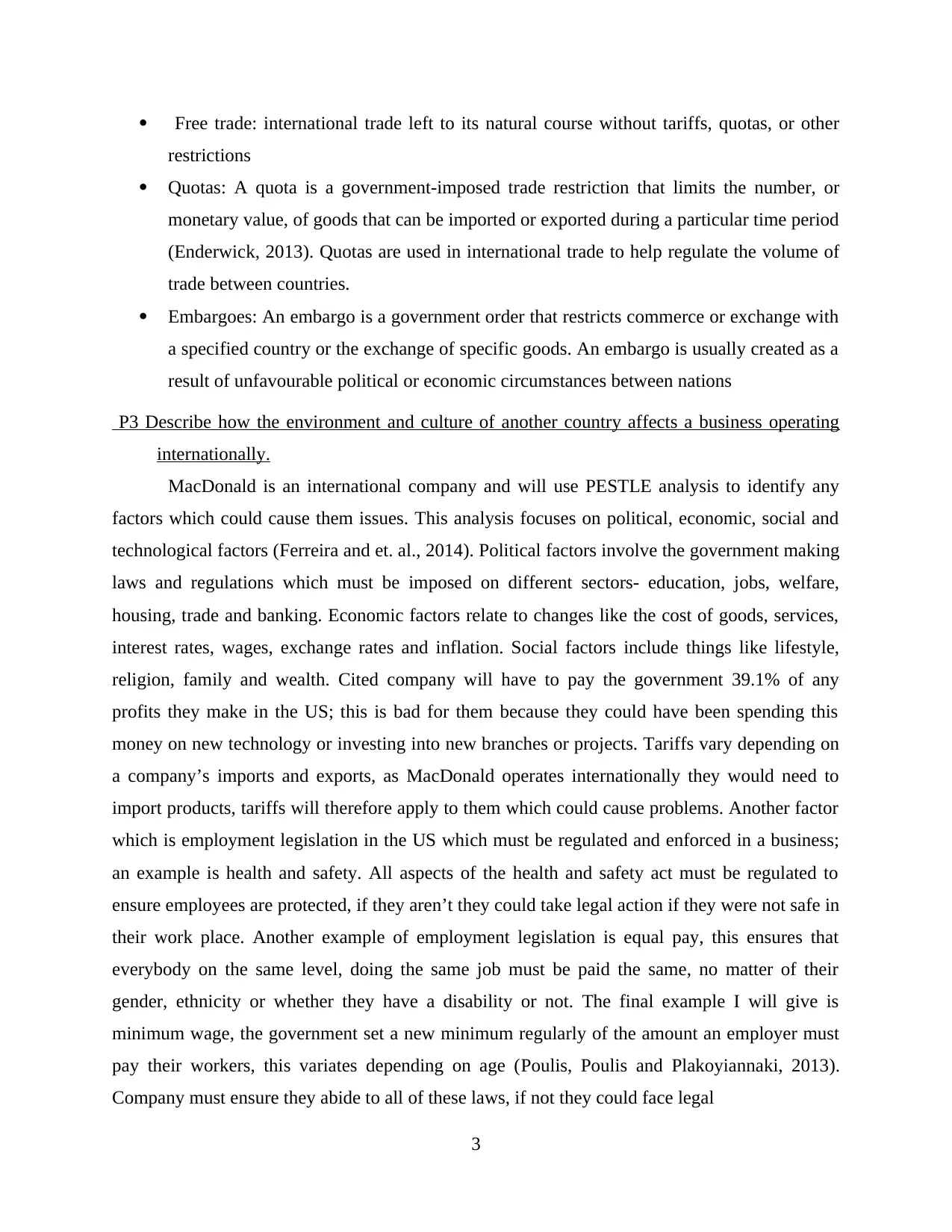
Free trade: international trade left to its natural course without tariffs, quotas, or other
restrictions
Quotas: A quota is a government-imposed trade restriction that limits the number, or
monetary value, of goods that can be imported or exported during a particular time period
(Enderwick, 2013). Quotas are used in international trade to help regulate the volume of
trade between countries.
Embargoes: An embargo is a government order that restricts commerce or exchange with
a specified country or the exchange of specific goods. An embargo is usually created as a
result of unfavourable political or economic circumstances between nations
P3 Describe how the environment and culture of another country affects a business operating
internationally.
MacDonald is an international company and will use PESTLE analysis to identify any
factors which could cause them issues. This analysis focuses on political, economic, social and
technological factors (Ferreira and et. al., 2014). Political factors involve the government making
laws and regulations which must be imposed on different sectors- education, jobs, welfare,
housing, trade and banking. Economic factors relate to changes like the cost of goods, services,
interest rates, wages, exchange rates and inflation. Social factors include things like lifestyle,
religion, family and wealth. Cited company will have to pay the government 39.1% of any
profits they make in the US; this is bad for them because they could have been spending this
money on new technology or investing into new branches or projects. Tariffs vary depending on
a company’s imports and exports, as MacDonald operates internationally they would need to
import products, tariffs will therefore apply to them which could cause problems. Another factor
which is employment legislation in the US which must be regulated and enforced in a business;
an example is health and safety. All aspects of the health and safety act must be regulated to
ensure employees are protected, if they aren’t they could take legal action if they were not safe in
their work place. Another example of employment legislation is equal pay, this ensures that
everybody on the same level, doing the same job must be paid the same, no matter of their
gender, ethnicity or whether they have a disability or not. The final example I will give is
minimum wage, the government set a new minimum regularly of the amount an employer must
pay their workers, this variates depending on age (Poulis, Poulis and Plakoyiannaki, 2013).
Company must ensure they abide to all of these laws, if not they could face legal
3
restrictions
Quotas: A quota is a government-imposed trade restriction that limits the number, or
monetary value, of goods that can be imported or exported during a particular time period
(Enderwick, 2013). Quotas are used in international trade to help regulate the volume of
trade between countries.
Embargoes: An embargo is a government order that restricts commerce or exchange with
a specified country or the exchange of specific goods. An embargo is usually created as a
result of unfavourable political or economic circumstances between nations
P3 Describe how the environment and culture of another country affects a business operating
internationally.
MacDonald is an international company and will use PESTLE analysis to identify any
factors which could cause them issues. This analysis focuses on political, economic, social and
technological factors (Ferreira and et. al., 2014). Political factors involve the government making
laws and regulations which must be imposed on different sectors- education, jobs, welfare,
housing, trade and banking. Economic factors relate to changes like the cost of goods, services,
interest rates, wages, exchange rates and inflation. Social factors include things like lifestyle,
religion, family and wealth. Cited company will have to pay the government 39.1% of any
profits they make in the US; this is bad for them because they could have been spending this
money on new technology or investing into new branches or projects. Tariffs vary depending on
a company’s imports and exports, as MacDonald operates internationally they would need to
import products, tariffs will therefore apply to them which could cause problems. Another factor
which is employment legislation in the US which must be regulated and enforced in a business;
an example is health and safety. All aspects of the health and safety act must be regulated to
ensure employees are protected, if they aren’t they could take legal action if they were not safe in
their work place. Another example of employment legislation is equal pay, this ensures that
everybody on the same level, doing the same job must be paid the same, no matter of their
gender, ethnicity or whether they have a disability or not. The final example I will give is
minimum wage, the government set a new minimum regularly of the amount an employer must
pay their workers, this variates depending on age (Poulis, Poulis and Plakoyiannaki, 2013).
Company must ensure they abide to all of these laws, if not they could face legal
3
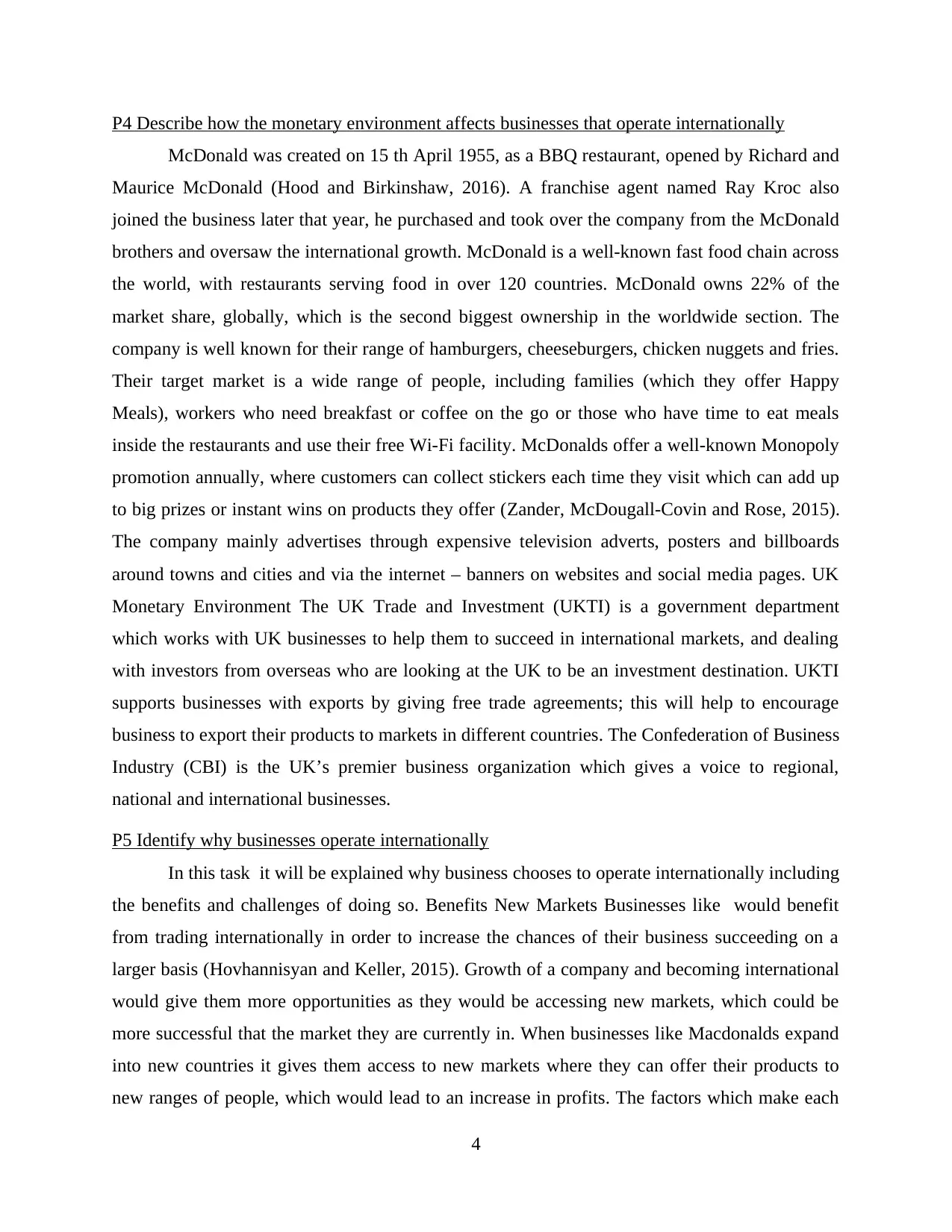
P4 Describe how the monetary environment affects businesses that operate internationally
McDonald was created on 15 th April 1955, as a BBQ restaurant, opened by Richard and
Maurice McDonald (Hood and Birkinshaw, 2016). A franchise agent named Ray Kroc also
joined the business later that year, he purchased and took over the company from the McDonald
brothers and oversaw the international growth. McDonald is a well-known fast food chain across
the world, with restaurants serving food in over 120 countries. McDonald owns 22% of the
market share, globally, which is the second biggest ownership in the worldwide section. The
company is well known for their range of hamburgers, cheeseburgers, chicken nuggets and fries.
Their target market is a wide range of people, including families (which they offer Happy
Meals), workers who need breakfast or coffee on the go or those who have time to eat meals
inside the restaurants and use their free Wi-Fi facility. McDonalds offer a well-known Monopoly
promotion annually, where customers can collect stickers each time they visit which can add up
to big prizes or instant wins on products they offer (Zander, McDougall-Covin and Rose, 2015).
The company mainly advertises through expensive television adverts, posters and billboards
around towns and cities and via the internet – banners on websites and social media pages. UK
Monetary Environment The UK Trade and Investment (UKTI) is a government department
which works with UK businesses to help them to succeed in international markets, and dealing
with investors from overseas who are looking at the UK to be an investment destination. UKTI
supports businesses with exports by giving free trade agreements; this will help to encourage
business to export their products to markets in different countries. The Confederation of Business
Industry (CBI) is the UK’s premier business organization which gives a voice to regional,
national and international businesses.
P5 Identify why businesses operate internationally
In this task it will be explained why business chooses to operate internationally including
the benefits and challenges of doing so. Benefits New Markets Businesses like would benefit
from trading internationally in order to increase the chances of their business succeeding on a
larger basis (Hovhannisyan and Keller, 2015). Growth of a company and becoming international
would give them more opportunities as they would be accessing new markets, which could be
more successful that the market they are currently in. When businesses like Macdonalds expand
into new countries it gives them access to new markets where they can offer their products to
new ranges of people, which would lead to an increase in profits. The factors which make each
4
McDonald was created on 15 th April 1955, as a BBQ restaurant, opened by Richard and
Maurice McDonald (Hood and Birkinshaw, 2016). A franchise agent named Ray Kroc also
joined the business later that year, he purchased and took over the company from the McDonald
brothers and oversaw the international growth. McDonald is a well-known fast food chain across
the world, with restaurants serving food in over 120 countries. McDonald owns 22% of the
market share, globally, which is the second biggest ownership in the worldwide section. The
company is well known for their range of hamburgers, cheeseburgers, chicken nuggets and fries.
Their target market is a wide range of people, including families (which they offer Happy
Meals), workers who need breakfast or coffee on the go or those who have time to eat meals
inside the restaurants and use their free Wi-Fi facility. McDonalds offer a well-known Monopoly
promotion annually, where customers can collect stickers each time they visit which can add up
to big prizes or instant wins on products they offer (Zander, McDougall-Covin and Rose, 2015).
The company mainly advertises through expensive television adverts, posters and billboards
around towns and cities and via the internet – banners on websites and social media pages. UK
Monetary Environment The UK Trade and Investment (UKTI) is a government department
which works with UK businesses to help them to succeed in international markets, and dealing
with investors from overseas who are looking at the UK to be an investment destination. UKTI
supports businesses with exports by giving free trade agreements; this will help to encourage
business to export their products to markets in different countries. The Confederation of Business
Industry (CBI) is the UK’s premier business organization which gives a voice to regional,
national and international businesses.
P5 Identify why businesses operate internationally
In this task it will be explained why business chooses to operate internationally including
the benefits and challenges of doing so. Benefits New Markets Businesses like would benefit
from trading internationally in order to increase the chances of their business succeeding on a
larger basis (Hovhannisyan and Keller, 2015). Growth of a company and becoming international
would give them more opportunities as they would be accessing new markets, which could be
more successful that the market they are currently in. When businesses like Macdonalds expand
into new countries it gives them access to new markets where they can offer their products to
new ranges of people, which would lead to an increase in profits. The factors which make each
4
⊘ This is a preview!⊘
Do you want full access?
Subscribe today to unlock all pages.

Trusted by 1+ million students worldwide
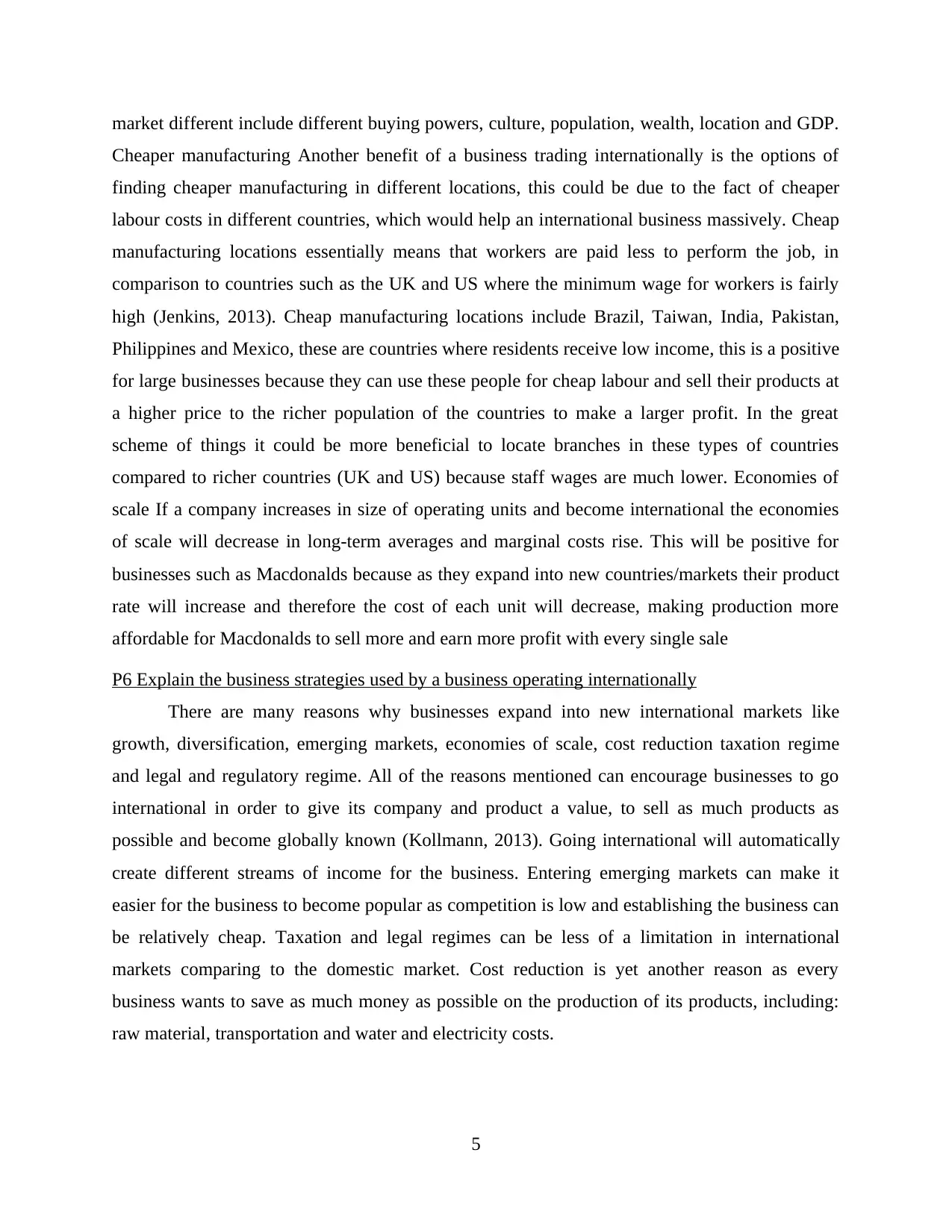
market different include different buying powers, culture, population, wealth, location and GDP.
Cheaper manufacturing Another benefit of a business trading internationally is the options of
finding cheaper manufacturing in different locations, this could be due to the fact of cheaper
labour costs in different countries, which would help an international business massively. Cheap
manufacturing locations essentially means that workers are paid less to perform the job, in
comparison to countries such as the UK and US where the minimum wage for workers is fairly
high (Jenkins, 2013). Cheap manufacturing locations include Brazil, Taiwan, India, Pakistan,
Philippines and Mexico, these are countries where residents receive low income, this is a positive
for large businesses because they can use these people for cheap labour and sell their products at
a higher price to the richer population of the countries to make a larger profit. In the great
scheme of things it could be more beneficial to locate branches in these types of countries
compared to richer countries (UK and US) because staff wages are much lower. Economies of
scale If a company increases in size of operating units and become international the economies
of scale will decrease in long-term averages and marginal costs rise. This will be positive for
businesses such as Macdonalds because as they expand into new countries/markets their product
rate will increase and therefore the cost of each unit will decrease, making production more
affordable for Macdonalds to sell more and earn more profit with every single sale
P6 Explain the business strategies used by a business operating internationally
There are many reasons why businesses expand into new international markets like
growth, diversification, emerging markets, economies of scale, cost reduction taxation regime
and legal and regulatory regime. All of the reasons mentioned can encourage businesses to go
international in order to give its company and product a value, to sell as much products as
possible and become globally known (Kollmann, 2013). Going international will automatically
create different streams of income for the business. Entering emerging markets can make it
easier for the business to become popular as competition is low and establishing the business can
be relatively cheap. Taxation and legal regimes can be less of a limitation in international
markets comparing to the domestic market. Cost reduction is yet another reason as every
business wants to save as much money as possible on the production of its products, including:
raw material, transportation and water and electricity costs.
5
Cheaper manufacturing Another benefit of a business trading internationally is the options of
finding cheaper manufacturing in different locations, this could be due to the fact of cheaper
labour costs in different countries, which would help an international business massively. Cheap
manufacturing locations essentially means that workers are paid less to perform the job, in
comparison to countries such as the UK and US where the minimum wage for workers is fairly
high (Jenkins, 2013). Cheap manufacturing locations include Brazil, Taiwan, India, Pakistan,
Philippines and Mexico, these are countries where residents receive low income, this is a positive
for large businesses because they can use these people for cheap labour and sell their products at
a higher price to the richer population of the countries to make a larger profit. In the great
scheme of things it could be more beneficial to locate branches in these types of countries
compared to richer countries (UK and US) because staff wages are much lower. Economies of
scale If a company increases in size of operating units and become international the economies
of scale will decrease in long-term averages and marginal costs rise. This will be positive for
businesses such as Macdonalds because as they expand into new countries/markets their product
rate will increase and therefore the cost of each unit will decrease, making production more
affordable for Macdonalds to sell more and earn more profit with every single sale
P6 Explain the business strategies used by a business operating internationally
There are many reasons why businesses expand into new international markets like
growth, diversification, emerging markets, economies of scale, cost reduction taxation regime
and legal and regulatory regime. All of the reasons mentioned can encourage businesses to go
international in order to give its company and product a value, to sell as much products as
possible and become globally known (Kollmann, 2013). Going international will automatically
create different streams of income for the business. Entering emerging markets can make it
easier for the business to become popular as competition is low and establishing the business can
be relatively cheap. Taxation and legal regimes can be less of a limitation in international
markets comparing to the domestic market. Cost reduction is yet another reason as every
business wants to save as much money as possible on the production of its products, including:
raw material, transportation and water and electricity costs.
5
Paraphrase This Document
Need a fresh take? Get an instant paraphrase of this document with our AI Paraphraser
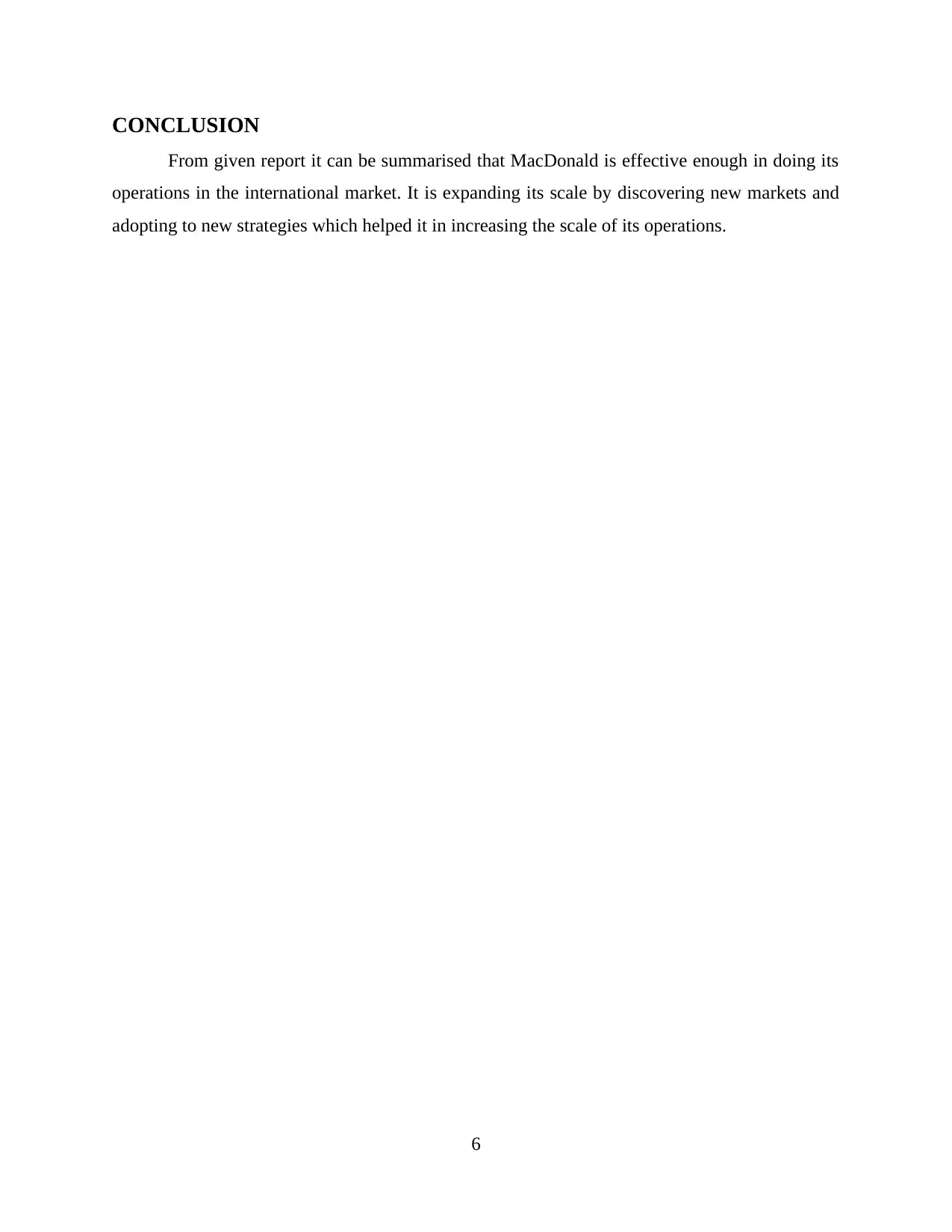
CONCLUSION
From given report it can be summarised that MacDonald is effective enough in doing its
operations in the international market. It is expanding its scale by discovering new markets and
adopting to new strategies which helped it in increasing the scale of its operations.
6
From given report it can be summarised that MacDonald is effective enough in doing its
operations in the international market. It is expanding its scale by discovering new markets and
adopting to new strategies which helped it in increasing the scale of its operations.
6
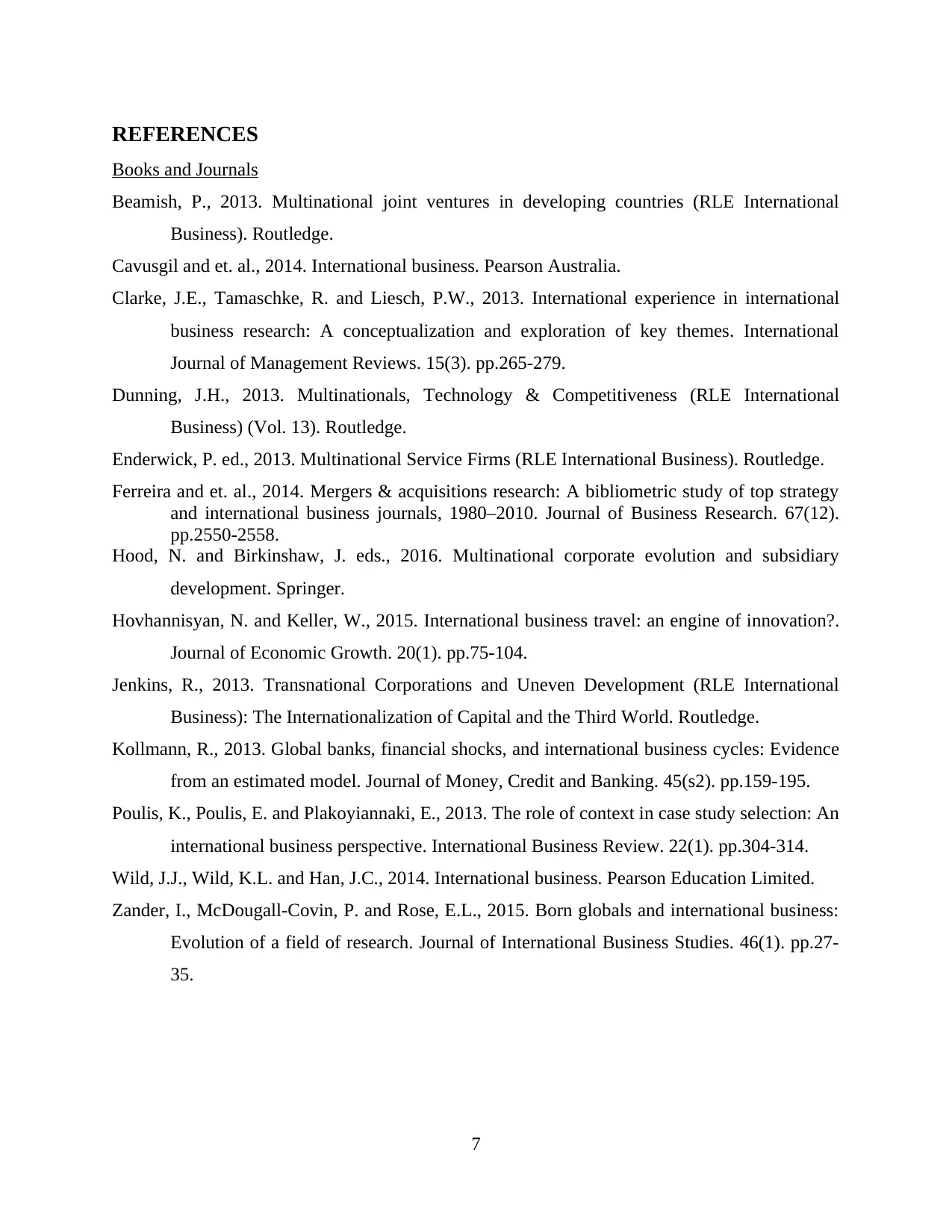
REFERENCES
Books and Journals
Beamish, P., 2013. Multinational joint ventures in developing countries (RLE International
Business). Routledge.
Cavusgil and et. al., 2014. International business. Pearson Australia.
Clarke, J.E., Tamaschke, R. and Liesch, P.W., 2013. International experience in international
business research: A conceptualization and exploration of key themes. International
Journal of Management Reviews. 15(3). pp.265-279.
Dunning, J.H., 2013. Multinationals, Technology & Competitiveness (RLE International
Business) (Vol. 13). Routledge.
Enderwick, P. ed., 2013. Multinational Service Firms (RLE International Business). Routledge.
Ferreira and et. al., 2014. Mergers & acquisitions research: A bibliometric study of top strategy
and international business journals, 1980–2010. Journal of Business Research. 67(12).
pp.2550-2558.
Hood, N. and Birkinshaw, J. eds., 2016. Multinational corporate evolution and subsidiary
development. Springer.
Hovhannisyan, N. and Keller, W., 2015. International business travel: an engine of innovation?.
Journal of Economic Growth. 20(1). pp.75-104.
Jenkins, R., 2013. Transnational Corporations and Uneven Development (RLE International
Business): The Internationalization of Capital and the Third World. Routledge.
Kollmann, R., 2013. Global banks, financial shocks, and international business cycles: Evidence
from an estimated model. Journal of Money, Credit and Banking. 45(s2). pp.159-195.
Poulis, K., Poulis, E. and Plakoyiannaki, E., 2013. The role of context in case study selection: An
international business perspective. International Business Review. 22(1). pp.304-314.
Wild, J.J., Wild, K.L. and Han, J.C., 2014. International business. Pearson Education Limited.
Zander, I., McDougall-Covin, P. and Rose, E.L., 2015. Born globals and international business:
Evolution of a field of research. Journal of International Business Studies. 46(1). pp.27-
35.
7
Books and Journals
Beamish, P., 2013. Multinational joint ventures in developing countries (RLE International
Business). Routledge.
Cavusgil and et. al., 2014. International business. Pearson Australia.
Clarke, J.E., Tamaschke, R. and Liesch, P.W., 2013. International experience in international
business research: A conceptualization and exploration of key themes. International
Journal of Management Reviews. 15(3). pp.265-279.
Dunning, J.H., 2013. Multinationals, Technology & Competitiveness (RLE International
Business) (Vol. 13). Routledge.
Enderwick, P. ed., 2013. Multinational Service Firms (RLE International Business). Routledge.
Ferreira and et. al., 2014. Mergers & acquisitions research: A bibliometric study of top strategy
and international business journals, 1980–2010. Journal of Business Research. 67(12).
pp.2550-2558.
Hood, N. and Birkinshaw, J. eds., 2016. Multinational corporate evolution and subsidiary
development. Springer.
Hovhannisyan, N. and Keller, W., 2015. International business travel: an engine of innovation?.
Journal of Economic Growth. 20(1). pp.75-104.
Jenkins, R., 2013. Transnational Corporations and Uneven Development (RLE International
Business): The Internationalization of Capital and the Third World. Routledge.
Kollmann, R., 2013. Global banks, financial shocks, and international business cycles: Evidence
from an estimated model. Journal of Money, Credit and Banking. 45(s2). pp.159-195.
Poulis, K., Poulis, E. and Plakoyiannaki, E., 2013. The role of context in case study selection: An
international business perspective. International Business Review. 22(1). pp.304-314.
Wild, J.J., Wild, K.L. and Han, J.C., 2014. International business. Pearson Education Limited.
Zander, I., McDougall-Covin, P. and Rose, E.L., 2015. Born globals and international business:
Evolution of a field of research. Journal of International Business Studies. 46(1). pp.27-
35.
7
⊘ This is a preview!⊘
Do you want full access?
Subscribe today to unlock all pages.

Trusted by 1+ million students worldwide

8
1 out of 10
Related Documents
Your All-in-One AI-Powered Toolkit for Academic Success.
+13062052269
info@desklib.com
Available 24*7 on WhatsApp / Email
![[object Object]](/_next/static/media/star-bottom.7253800d.svg)
Unlock your academic potential
Copyright © 2020–2026 A2Z Services. All Rights Reserved. Developed and managed by ZUCOL.




